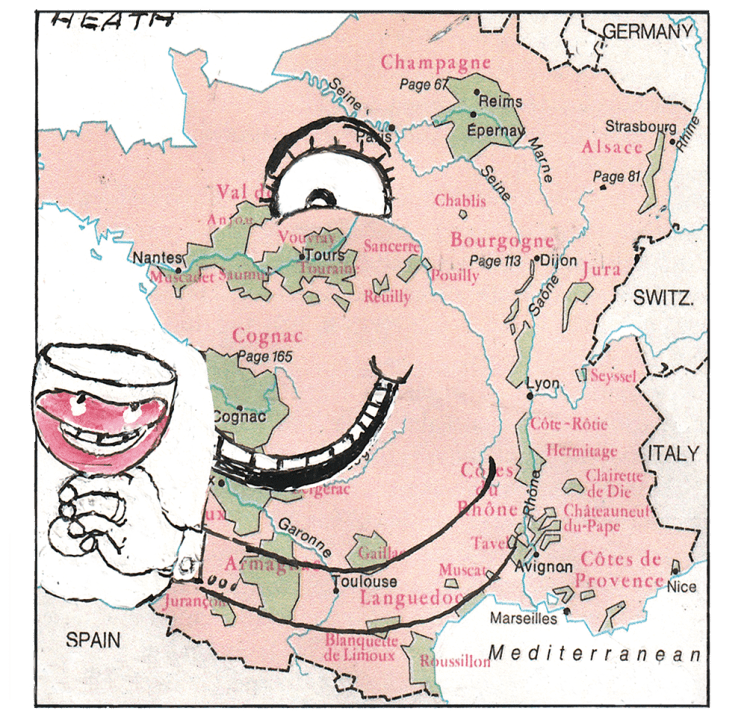
Henry Jeffreys has narrated this article for you to listen to.
Professional Englishmen and women – doctors, accountants and even journalists – could once afford to drink first-growth claret like Château Latour on a regular basis. In 1972, when the Daily Telegraph’s Guide to the Pleasures of Wine was published, Pomerol was still an obscure corner of Bordeaux, known for offering ‘very good value’.
Those days are long gone. Prices began to take off in the 1980s, with Auberon Waugh blaming ‘American millionaires looking to impress their guests’. The 1982 Bordeaux vintage was highly lauded by a then-unknown young lawyer called Robert Parker Jnr who would go on to become the most influential wine critic in the world. After this, anything Parker recommended became unaffordable to most British wine-lovers. In his diaries, Alan Clark lamented the soaring prices of his favourite wines. Château Palmer, once an accessible indulgence, had reached £100 a bottle. That now sounds like a bargain.
Next, the Americans discovered Burgundy, a region hitherto only really appreciated in Europe. Between 2004 and 2024 a bottle of Gevrey-Chambertin Premier Cru Clos St Jacques from Armand Rousseau rose from £52 to around £2,000. Middle-class British drinkers who had cellars full of French greats realised that their wines were far too valuable to drink, so they sold them. Wine became a commodity to be traded rather than enjoyed.
If the 200 per cent tariffs on EU wine and spirits that Donald Trump is threatening go ahead, this might be about to change. Without the richest country in the world snaffling up all the good stuff, the British might once again be able to afford to drink Château Palmer every now and then, instead of relying on Good Ordinary Claret. Burgundy could be enjoyed by wine-lovers, rather than hoarded and traded like gold bullion.
This would, of course, result in hardship for many growers, as the European wine industry weans itself off American money. But just think of the dividend for British drinkers! It would be party time, too, for the Californian wine industry, as all those tech bros (well, the ones who still drink) would stay at home with their Napa cabernet, Santa Barbara pinot noir and, yes, ‘California champagne’. There was much derision from the vibrant community of wine pedants over this last solecism from Trump, and yet such a thing does exist. The Americans never signed trademark agreements with the EU so have kept cheerfully labelling their domestic products things like ‘Mountain chablis’ and ‘Hearty burgundy’.
Burgundy could be enjoyed by wine-lovers, rather than hoarded and traded like gold bullion
While Europeans don’t drink a lot of Californian wine, they are partial to Jack Daniel’s and Jim Beam. A trade war between the EU and America could ruin this growing export market. But who might benefit? The plucky Canadians, of course, who make excellent American-style whiskies often at knock-down prices. I highly recommend Lot 40 rye. In even an informal boycott of American products, the Canadians are going to be the winners.
Meanwhile, countries that don’t face 200 per cent tariffs are well-placed to replace Bordeaux in the affections of American drinkers. Wines from South America, Australia and Lebanon (including Waugh’s favourite Chateau Musar) could be much more in demand. Marc Bouffard, known as ‘Englishman’s Claret’ on Instagram, is based in Boston and a noted fan of Bordeaux. He is already looking at other options. ‘I am curious about Bordeaux’s varietals in the wider world. I’d love to know more about the diversity of terroir in Australia, Chile and Argentina.’ But he is unconvinced by California champagne, which is ‘absolutely out of the question’.
Fizz lovers in the US might look to one European nation that should, if Keir Starmer doesn’t mess up, not be subject to tariffs. English sparkling wine houses such as Nyetimber and Gusbourne could be beneficiaries of the trade war, as well as the champagne houses like Pommery and Taittinger which had the foresight to invest in English vineyards.
Trade wars are nothing new, and global politics has long influenced what we drink. In the 17th century, the English began to shift from claret to port after Oliver Cromwell introduced the first Navigation Acts, originally aimed at punishing the Dutch, who dominated trade with France. The high duties led to Bordeaux, once an everyday wine, becoming a more exclusive product, with prestigious wines such as Haut-Brion selling for four times the price of ordinary claret. And the American Revolution itself has roots in taxes on drink. The spark was lit when the British Crown attempted to collect duties on imported molasses, which New Englanders used to distil into rum.
The winners and losers in this latest bout of international strife are hard to predict. Will wine students one day learn that Americans got a taste for Thai reds or Venezuelan sparklers during the great trade war of 2025? But as the world’s economy falls apart, at least there’s some hope that the British middle-classes might once again be able to enjoy a decent drop of claret.








Comments